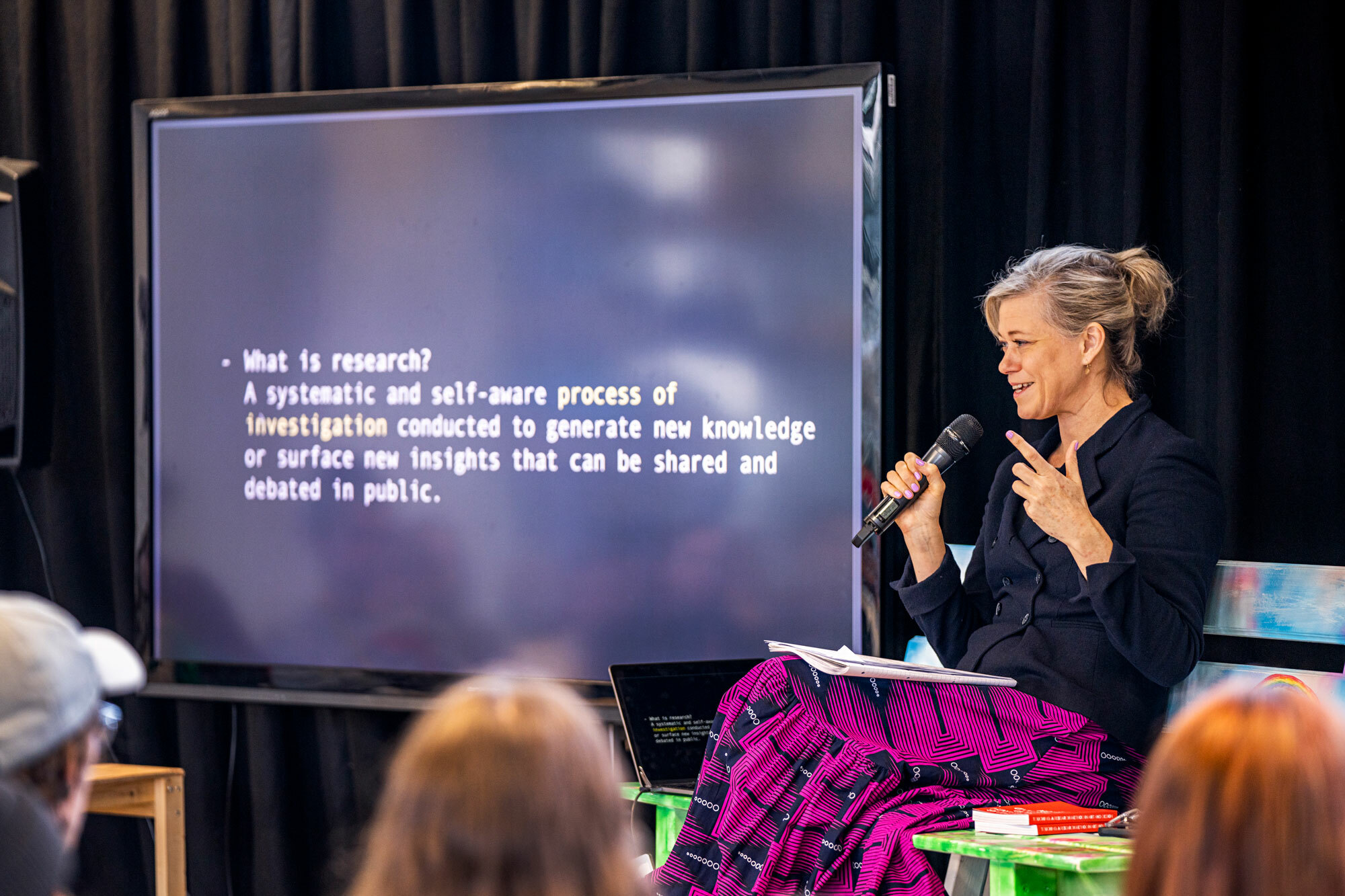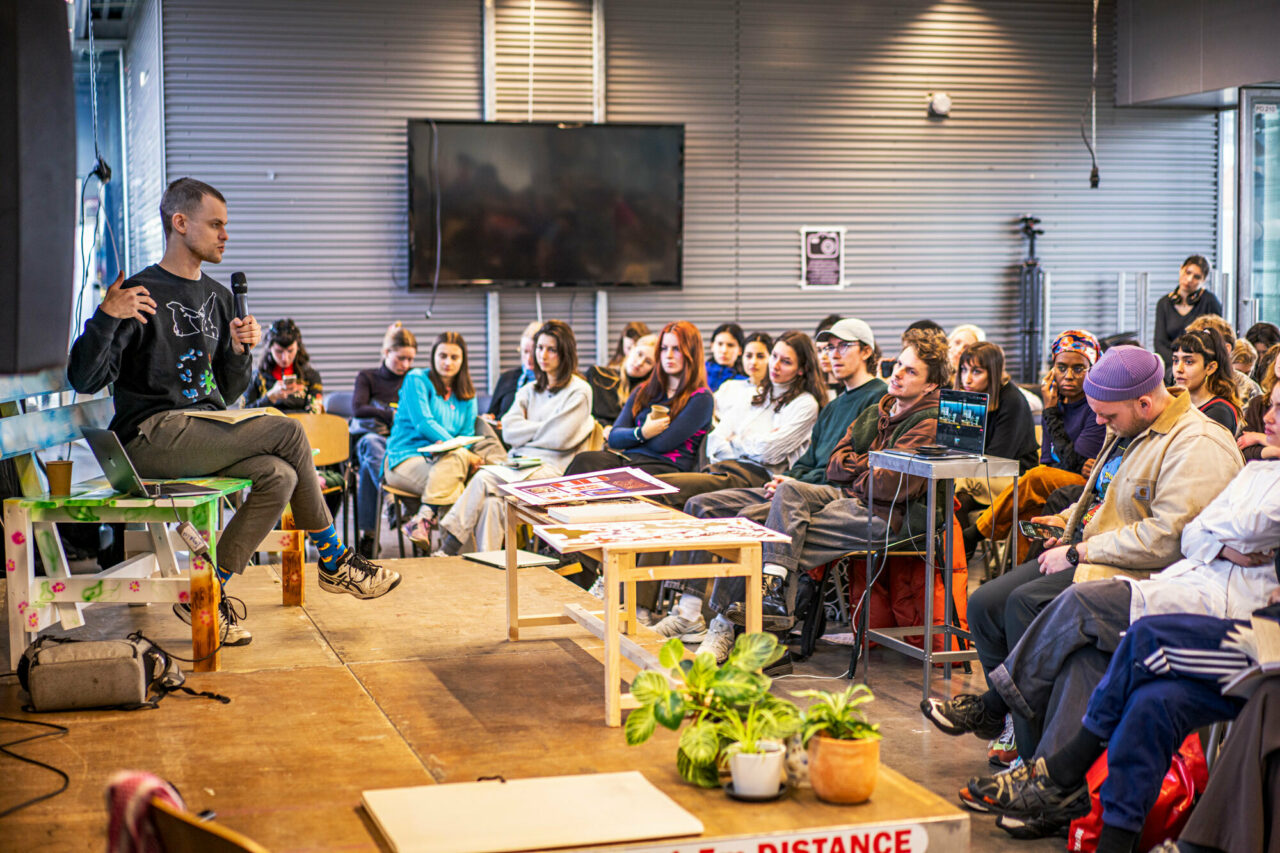Fieldwork and Research Week, 23-26 January 2023
The
As Graphic Design student at KABK throughout the duration of your study, you will conduct independent research related to topics that you find important. Not only is research and curiosity essential to broaden your knowledge, skillset and the context in which you work, but you are gaining valuable skills to be able to write your thesis and produce a final exam project at the end of your studies.
During the Research & Fieldwork week we looked outward to institutions, archives, factories and workplaces in the fields of trash recycling, archeological research and historical preservation and recognition. How can we use our experiences out in the field to better understand a starting point for research? How to relate broader societal interests to our own profession?
Symposium – Connections between Fieldwork and Research
Dirk Vis (theory tutor Y4 & writer) talked about his own practice as a researcher and writer, and showed us a variety of artistic and literary examples of research taking unique pathways.
Dialogue as a Method of Research
By Maarten Cornel and Ingrid Grunwald (Philosophy tutor and coordinator)
Members of the Research Group Politics of Knowledge elaborated on their research on the dialogue as a method of community building in a national and international context. By interviewing each other through 3 similar questions and showing their own images connected to the question, they elaborated on the different ways people see the world due to their own background and the difficulties in communication because of it.
Developing a Research Question
By Alice Twemlow (Design Lector KABK)
Step by step guide on what research is and how to come up with a good research question. Alice took her public on a research trip with a warning of difficulties which might occur, with examples of the many ways to find your data, the curiosity you need, the flexibilty you need and the limitations you have to give yourself.
Fieldwork – making of a graduation project
By Radek Gorniak in conversation with Lauren Alexander (Graphic Design alumni 2021 and acting co-head Graphic Design)
Radek did fieldwork for his graduation in a tapestry factory in Poland. This factory and its community brought him to unexpected design solutionst. He took our students along on his thesis- and graduation journey. Lauren Alexander interviewed Radek by asking him in depth questions on aspects of his research process.

Field trips
With five exciting excursions to select from students could dive into various fields and practices.
The Black Archives & De Kids of Amsterdam, both in Amsterdam
“Dutch Black Heritage and Community”, archival legacy of Black Dutch writers and scientists with researcher Isabel Britto and Natalie Oldenstam. Organisated by Ingrid Grünwald and tutor Els Kuipers. Read more about this field trip here.
Museum Meermanno, The Hague
“The Role of Book in (De)colonialisation” with head of collections Rickey Tax and Aafke Boerma. With tutors Ben Earl and Maarten Cornel. Read more about this field trip here.
Archaeology Department of the Municipality of the Hague
Unearthing, restoring, retelling with geologists and archeologists Christiaan Rieffe, Mignonne Lenoir, Robert van de Mijle Meijer and NLN alumnus filmmaker Christina Lavosi. Organised by acting co-head Lauren Alexander with tutor Anna Hoetjes.
Rotterdam Harbour
“Port Proximities” non humans and mega infrustrusture collide with marine biologist Peter Paalvast and architect Juliette Gilson. Organised by Marit van der Meulen and tutor Louis Braddock Clarke. Read more about this field trip here.
Museum Plantin-Moretus
Antwerp discovering the history of the printing press, moveable type and more with type-design researcher and expert Frank Blokland and acting co-head Chantal Hendriksen.
The Research Question
The next day the students were invited to formulate a research question, inspired by what they saw and experienced during one of the field trips. All questions were presented during a one-hour wander through this research forest of questions.
*As always this Project was also Inspired by the work of Audre Lorde, "The Master's Tools Will Never Dismantle the Master's House", (1984) she speaks about the unrecognized racism which existed within feminist work at the time. She questions if it is possible to create change within existing, dominant paradigms.



